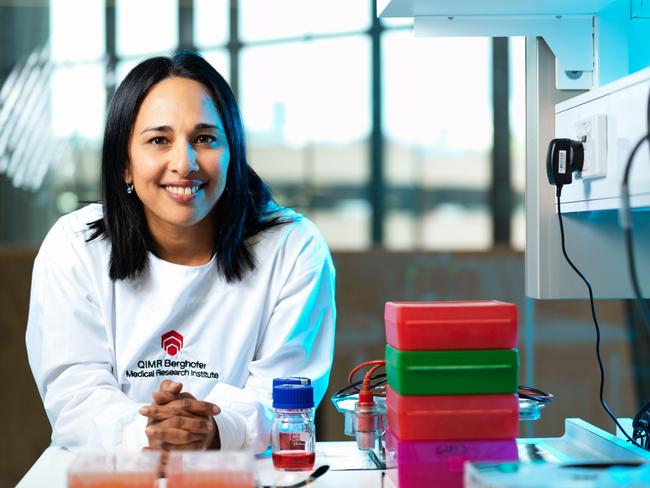Qld scientists in ‘remarkable’ long Covid breakthrough
Queensland scientists are leading the world in the development of an oral drug that will not only treat debilitating long Covid but has the potential to stop reinfections of the virus even if new variants emerge.
QLD News
Don't miss out on the headlines from QLD News. Followed categories will be added to My News.
Queensland scientists are leading the world in the development of an oral drug that will not only treat debilitating long Covid but has the potential to stop reinfections of the virus even if new variants emerge.
The breakthrough, by researchers at QIMR Berghofer, is the biggest discovery in the fight against Covid since 2020 when the University of Queensland joined international laboratories in the global race to invent a vaccine to stave off the killer virus.
QIMR’s preclinical trials have proved highly successful in efficacy and safety and the development of the drug is about to move into human trials.
QIMR’s research has uncovered the pathway that the virus uses to induce the persistent inflammation which causes organ damage found in long Covid.
“This study shows our drug prevents that inflammation and even repairs damaged lung tissue in preclinical models. It is both a prevention and a treatment,” Epigeneticist and co-lead author, Professor Sudha Rao who heads QIMR Berghofer’s Gene Regulation & Translational Medicine Group said.

The internationally peer-reviewed findings of the Queensland study have been published in the prestigious journal Nature Communications.
Professor Rao said the drug was tested repeatedly by independent laboratories across the world using a variety of preclinical models.
“The results of this study are really exciting. It shows our drug, NACE2i, stops the virus replicating and protects against reinfection,” Professor Rao said.
The scientist said the current vaccines do not offer long-term protection against various variants and it is hoped the new drug will work alongside the vaccine to support protection.
The aim is to create an oral drug rather than a vaccine.
“We believe it could be a highly promising adjuvant to boost the effectiveness of existing vaccines providing long-lasting protection against any variant of the virus that tries to enter the cells,” she said.
Over the course of the pandemic, hundreds of millions of people have been infected with SARS-CoV-2 which has claimed many millions of lives. New variants continue to emerge contributing to ongoing waves of infection.
Long Covid is thought to affect between 10-20 per cent of those infected with the virus.
Debilitating long-term symptoms include fatigue, breathlessness and brain fog. It is a significant global health burden, affecting everyday functioning with many sufferers unable to work or carry out household tasks.
“We want to help patients. This is why we work in science. We are really proud of what we have achieved here. We are confident NACE2i is a potential treatment for long Covid that will relieve those debilitating symptoms and revive immune function,” Professor Rao said.
First author and QIMR Berghofer Research Officer Dr Wen Juan Tu said it was very exciting to see NACE2i repairing damaged lung tissue in preclinical models.
“The images are really remarkable. In the damaged lung, you see it is missing the surface layer of the lung bronchiolearea. After treatment with NACE2i, the lung is restored to normal function with a healthy surface layer,” Dr Tu said.
Immunologist and co-lead author Professor Nabila Seddiki, who is Research Director of Immunology & Infectious Diseases Commissariat à l’Energie Atomique (CEA), Paris-Saclay University and INSERM in France tested NACE2i in their preclinical Covid-19 models.
“When we looked at the results it was very clear the peptides were inhibiting inflammation in our SARS-CoV-2 models which was really great to see. We have been working together for a long time, with each of us bringing our own expertise to the work and that’s how we have achieved what we have,” Professor Seddiki said.
The next step is to begin clinical trials of NACE2i.
Professor Rao paid tribute to funding from philanthropists and the Queensland Government which enabled the research.
“In the early days of the pandemic, this was just an idea. This really shows that if we didn’t have philanthropists like Clive Berghofer, and Queensland Health having the confidence in us to give us the funding, we would not be here. I cannot stress enough that without that initial funding, we would not have achieved what we have,” Professor Rao said.
More Coverage
Originally published as Qld scientists in ‘remarkable’ long Covid breakthrough





